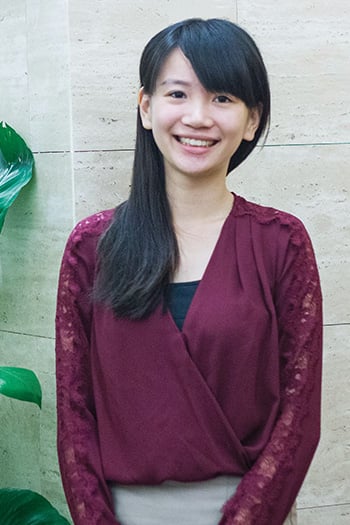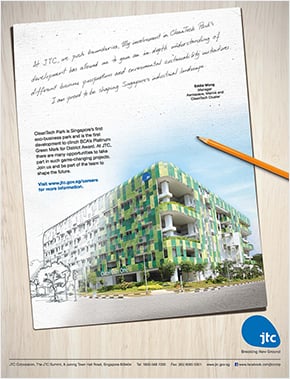Since its inception in
1968, JTC Corporation
has played an important
role in Singapore’s
industrial development.
It continues to shape the
future of industry spaces
through landmark
projects like the Jurong
Rock Caverns, CleanTech
Park and Jurong Island.
As a small nation with scarce resources, Singapore must work hard to stay ahead of the curve
in ensuring that her industries are well-supported with economic space and resources way
into the future.
For 47 years, JTC has been transforming Singapore’s economic spaces in tandem with the nation’s
rapid evolution into a first-world economy. It continues to forge ahead in catalysing the growth of
industries and enterprises through its visionary, innovative and future-ready developments.
Two JTC scholars—Choo Li Jie and Sheryl Ho—have seen up-close JTC’s strong work and
professional ethos. They have been the beneficiaries of the organisation’s nurturing and guidance,
and given opportunities to pursue dynamic careers while contributing to Singapore’s economic
development.
Spearheading development
Li Jie was drawn to JTC because of its key role in developing key infrastructure for Singapore’s
businesses and industries to flourish. As an integral contributor to Singapore’s economic growth
since the early days of independence, JTC has spearheaded many innovative projects that broke
away from convention – but also proved to be visionary and pragmatic in addressing the challenges
faced by land-scarce Singapore.
She likens JTC’s meticulous efforts of bolstering Singapore’s industries to the stacking of LEGO
blocks, saying, “The cumulative result of even the smallest action or idea can translate into tangible
outcomes with a very real and positive impact on the industry. For instance, JTC has already
pioneered innovative spaces like the Jurong Rock Caverns, Southeast Asia’s first commercial
underground storage facility for liquid hydrocarbons.”

Choo Li Jie
JTC Undergraduate Scholar
Designation:
Assistant Manager, Land Planning Division
Studied:
Master of Science in City Design and Social
Science, London School of Economics &
Political Science, UK
Bachelor of Science in Urban Planning,
Design and Management,
University College London, UK
"...the satisfaction derived from formulating a rigorously thought-out policy that bears fruit is very rewarding!"
On Sheryl’s end, she wanted a career that would allow her to make a direct and meaningful
contribution to Singapore while offering opportunities to implement ideas that would help develop
the Singapore economy. She recalls, “JTC offers me the chance to be involved in meaningful work
that develops and challenges me.
“Furthermore, I am also given the chance to
apply my knowledge in chemical engineering
to a local context and help shape Singapore’s
economic and industrial landscape.”
Always one step ahead
Sheryl is now an Assistant Manager with
JTC’s Biomedical and Chemicals Cluster. She
says, “The chemicals industry is a significant
contributor to Singapore’s manufacturing
output, and it is vital to develop unique and
specialised infrastructure solutions to meet this
sector’s needs. For instance, I was involved in
the development of the JTC Chemicals Hub @
Tuas View, which is a unique and innovative
development that incorporates built-in safety
provisions that meet the industry’s high
standards as well as shared facilities that help
companies to enjoy economies of scale and
business synergies.
“This project is a good example of how JTC
constantly works to conceptualise and develop
innovative spaces to meet critical infrastructure
gaps in the industry. I am really glad to be part
of these efforts!”
Her compatriot Li Jie is also an Assistant
Manager at JTC, albeit in a different role
– she works in the Land Planning & Policy
Department, where she analyses and keeps
stock of Singapore’s industrial land demand and
supply, and keeps an eye on both the near- and
long-term outlook.
She explains, “Sustainable growth is
important for land-scarce Singapore. We need to
plan ahead and be very careful with our land use
policies. I liaise with my colleagues and external
agencies such as the Urban Redevelopment
Authority (URA), Singapore Land Authority (SLA)
and the Economic Development Board (EDB) to discuss and review industrial land policies.
“Even as we consider the viewpoints of
multiple stakeholders, it is imperative that our
policies are sound and future-proof. This can be
time-consuming, but the satisfaction derived
from formulating a rigorously thought-out
policy that bears fruit is very rewarding!”
An enriching journey
Of course, Sheryl’s and Li Jie’s roles in helping
to keep Singapore’s industrial growth on an
upward trajectory is no mean feat, and JTC has
given both scholars many opportunities to help
them succeed in their respective roles.
While studying in the UK, Li Jie went on study
trips around Europe, visiting Porto in Portugal
and Barcelona in Spain. She enthuses, “It was
a great chance to enjoy Europe’s public spaces,
learn from the great urban designers of top
cities, and envision how to make Singapore and
our industrial estates even better urban spaces.
“I was also lucky to be actively involved in
several projects during my internship at JTC’s
Land Planning Division. I helped examine the
provision of amenity spaces in Jurong Industrial
Estate and was also involved in helping
CleanTech Park obtain Singapore’s first Green
Mark District award. I was fortunate to have
excellent mentors every step of the way, during
my internship and even at work today!”
Sheryl Ho Wen Jia
JTC Undergraduate Scholar
Designation:
Assistant Manager,
Biomedical & Chemicals Cluster
Studied:
Master of Engineering,
Chemical Engineering,
Imperial College London, UK
Sheryl clearly recalls how JTC supported her
decision to embark on an internship with Shell
in the Netherlands. She says, “My mentors in
JTC felt it would be useful for me to gain some
relevant industry experience, and they were
right as the internship was an eye-opener. It
also gave me valuable first-hand overseas work exposure and knowledge about the chemicals
industry.
“Furthermore, I faced a steep and intensive
learning curve when I first joined JTC as I had no
prior background in real estate. I had companies
approaching me for help in resolving their lease-management
issues during my first week of
work and I was expected to solve these issues
quickly. Fortunately, my colleagues were there
to offer guidance and really helped to speed
up my learning process. The JTC Foundation
Programme was also immensely helpful as it
provided new hires like me with a background of
the real estate industry and the multiple aspects
of JTC.”
Both scholars are keen to dish out some
advice to those who share their passion to make
a difference. Li Jie says, “Seize every chance to
broaden your horizons and accumulate new
experiences during the course of your studies.
These real-world skills and new modes of
thinking will definitely be your most useful
takeaways!”
Sheryl agrees, while cautioning against
seeing the JTC scholarship simply as a means
of financing one’s education. She concludes,
“A scholarship is a long-term commitment to
your future career. Aspiring JTC undergraduate
scholars should do their research and fully
understand the nature of JTC’s work, for only
then can they be sure of their decision and
better equip themselves to make the most out
of the scholarship.”



